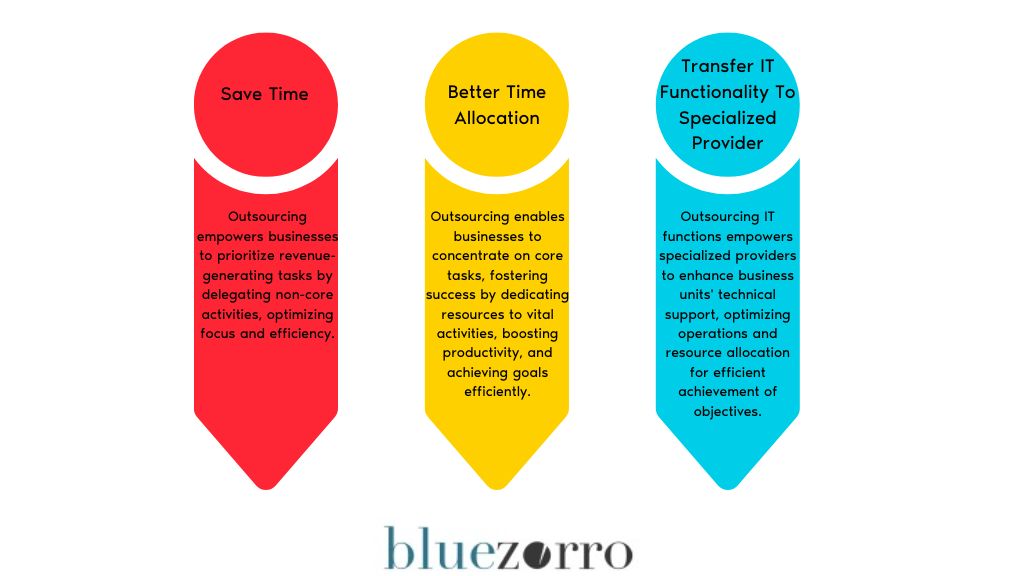So, you’ve just launched your first IT product.
Congrats! But what comes next? Are you prepared to handle all the integrations and APIs in your project?
Maybe your development team can handle it, but hiring an IT support specialist can be expensive.
That’s where outsourcing IT support comes in.
IT outsourcing is when you hire another business to handle your IT support services.
The IT services market is expected to grow at a rate of 10.36% between 2022 and 2027.
With increasing IT expenditure worldwide, more companies are turning to outsourcing to meet their IT needs.
Outsourcing your IT projects and operations allows you to tap into the expertise of a skilled team without disrupting your business.
If you’re considering outsourcing IT support, consider Blue Zorro, operating at an international level.
We specialize in providing IT outsourcing services to industries like MarTech, Logistics, Healthcare, EdTech, Legal, and IoT.
With our services, you can expect top-notch technical support and maintenance.
We offer a guaranteed service level agreement (SLA) and streamline application management through our Service Desk.
Our goal is to make your IT support as seamless as possible.
Outsourcing IT support can be a game-changer for your business. It allows you to focus on what you do best while leaving the technical stuff to the experts.
So why not give it a try?
To that end, this post highlights some of the main benefits of hiring an IT company to fulfill your business requirements.
Let’s get started.
6 Benefits of Outsourcing IT Service Requirements In 2023

1. Preferred IT Services
When you outsource your IT services, many companies offer different levels or tiers of service.
These tiers require you to pay a fixed monthly, quarterly, or annual charge based on the services included in that tier.
Some companies may only require IT support in case of an emergency, so they choose a plan where the IT provider is just “on call”.
This way, they only pay for the services they actually use.
On the other hand, if you run a larger business that frequently needs outsourced IT support, it may be beneficial for you to choose a more detailed service plan.
This plan would include a wider range of services to accommodate your company’s needs on a routine basis.
However, if your business rarely experiences IT issues and only needs occasional help setting up new hardware, software, or networks, then a cheaper plan may be more suitable.
This plan would provide the necessary assistance when you need it, without the additional services that you may not require.
The great thing about these service tiers is that you have the flexibility to alter your plan as your needs change.
If your business grows or experiences more IT issues, you can easily upgrade to a higher tier.
On the other hand, if your needs decrease, you can also downgrade to a lower tier and save costs.
Ultimately, the preferred service level for your company will depend on its size, IT requirements, and budget.
It’s important to assess your specific needs and choose a plan that aligns with them while also providing flexibility for future adjustments.
2. Minimized Downtime
Based on a study, approximately 82% of companies have encountered unplanned downtime to varying degrees within the past few years.
On average, these downtimes can persist for at least four hours each.
When you outsource your IT services, you benefit from reduced downtime.
How is this possible?
Well, the outsourced IT provider uses advanced monitoring systems to identify any potential issues before they affect your users.
By catching these problems early on, they can be fixed promptly, preventing any disruptions to your business operations.
And let’s be honest, downtime can be extremely costly. It eats into your profits and can damage your reputation.
Just think about it, if your website crashes or your systems go down, how will your customers feel? They’ll probably get frustrated, and that’s not good for your business.
Outsourcing your IT services helps you avoid these situations.
The provider takes proactive measures to ensure smooth operations, minimizing any impact on your business.
So, by partnering with an outsourced IT provider, you can rest assured that they are actively working to prevent downtime and keep your business running smoothly. It’s a smart move that can save you time, money, and headaches in the long run.
3. Better Economics & Feasibility Aspects

3.1. Save Time
Outsourcing helps businesses save time and focus on what really matters.
By outsourcing tasks that are not essential to the core business, companies can put more energy into activities that generate revenue.
This means that they can intensify and prioritize the subsystems that directly contribute to their bottom line.
3.2. Better Time Allocation
With outsourcing, businesses can allocate more time to their core activities.
They can now devote more resources to the tasks that truly matter and that drive their success.
By doing so, companies can increase productivity and efficiency, allowing them to achieve their goals more effectively.
3.3. Transfer IT Functionality To Specialized Provider
One of the key benefits of outsourcing is that it allows businesses to transfer IT functionality and processing to a specialized IT provider.
This smooth transition enables the IT provider to support the company’s business units in a technically sound manner.
It ensures that the IT infrastructure is set up to efficiently support the highly productive work of the company’s employees.
Overall, outsourcing is a strategic decision that enables businesses to streamline their operations and achieve greater economic efficiency.
By focusing on their core competencies and entrusting non-essential tasks to reliable partners, companies can optimize their resources and achieve their business objectives more effectively.
4. Better Use of In-House and Out-House Resources
Investing in your in-house IT support and services staff can be beneficial.
- Better Use Of In-House Resources
- By outsourcing specialists, your in-house team can focus on other important business-related duties.
- This allows your internal resources to dedicate their time and energy toward business expansion and development.
- As a result, you save both time and money, which can then be utilized to meet the organization’s more significant needs.
- Having a strong in-house IT support team is crucial for any business.
- However, sometimes it can be a challenge to keep up with the ever-changing technological landscape.
- Better Use Of Out-House Resources
This is where outsourcing specialists can come in handy.
- They can provide the expertise and knowledge needed to handle complex IT issues, while your in-house team can focus on tasks that directly contribute to the growth and success of the company.
- By outsourcing, you can also tap into specialized skills and experience that may not be available within your in-house team.
- This brings a fresh perspective and innovative solutions to the table.
- Additionally, it allows your team to stay updated with the latest industry trends and advancements, ensuring that your business stays ahead of the competition.
- Moreover, outsourcing can help streamline your IT operations, resulting in increased efficiency and cost savings.
- Instead of investing in expensive infrastructure and equipment, you can rely on the expertise of external specialists who already have the necessary resources in place.
- This not only reduces overhead costs but also allows for scalability and flexibility as your business grows.
- Overall, the enhanced application of resources through outsourcing IT support and services can have a positive impact on your organization.
It allows your in-house team to focus on core business functions, while external specialists handle the technical aspects.
This not only improves productivity but also ensures that your business is well-equipped to adapt to technological advancements and stay ahead in the ever-evolving digital landscape.
5. Minimized Threats To In-House Data Security

When it comes to outsourcing IT, one major concern is security. After all, companies store a lot of personal data that could be at risk.
A security breach could result in data being stolen, deleted, held for ransom, or even altered. And the consequences can be severe.
If employee data is compromised, it could lead to lawsuits and a loss of trust.
The same goes for client and customer data, or even patient data for healthcare providers.
But here’s the good news: managed service companies are experts when it comes to cybersecurity.
They know all the ins and outs of how hackers steal login credentials and critical data. So you can rest easy knowing that they will protect you from any potential dangers.
Not only that, but they also provide 24/7 monitoring to quickly address any security issues that may arise.
And if you’re worried about your staff’s cybersecurity knowledge, don’t fret.
Managed service companies also offer staff training to ensure that everyone is well-equipped to handle any potential threats.
So when it comes to outsourcing your IT needs, remember that security is a top priority.
And with managed service companies on your side, you can feel confident that your data is in safe hands.
6. Better Compliance & Attention To Details
Keeping up with regulations can be incredibly stressful for businesses.
The government’s laws and rules are often difficult to navigate and are constantly changing. It can feel like a never-ending battle to stay compliant.
That’s where an external IT service provider can come in handy.
They specialize in ensuring complete compliance and effective risk management.
Instead of spending hours poring over legal documents, you can rely on them to handle it for you. It takes a huge weight off your shoulders.
But compliance isn’t the only thing they can help with. It’s important to remember that your company’s success isn’t the be-all and end-all of the world. There are other things at play.
Customers still expect growth, even if you don’t have all the resources to make it happen.
And that’s where qualified IT professionals can really make a difference. When you have experts taking care of your IT needs, you can focus on what you do best.
By combining your passion and expertise with technology, you have a winning combination.
And that’s what leads to success. So don’t be afraid to lean on IT professionals for support.
They can help you navigate the complicated world of regulations and allow you to focus on what really matters – growing your business.
Over To You
When choosing a managed IT service provider (MSP), it’s important to consider your current and future needs.
Sure, you might be focused on getting a 24/7 IT help desk right now, but what about down the line?
Maybe you want to move your operations to the cloud. Planning ahead is key, even though switching providers can be a pain in the neck and cost you time and money.
Once you’ve figured out your service requirements, you can start looking for an MSP that meets them.
Don’t worry about investing in long-term strategies that you might not need immediately. It’s better to have options and be prepared for the future.
Keep in mind that there are many MSPs out there offering similar services, so don’t limit yourself to just one.
Take the time to assess each one based on factors like responsiveness, transparency, knowledge, scalability, and more.
It’s important to differentiate between them and get a sense of what it will be like to work with each organization.
Overall, finding the right managed IT service provider is about thinking ahead and considering your specific needs.
Don’t rush into a decision, take your time, and do your research.
After all, this is a partnership that will impact your business, so you want to make sure you’re making the right choice.


